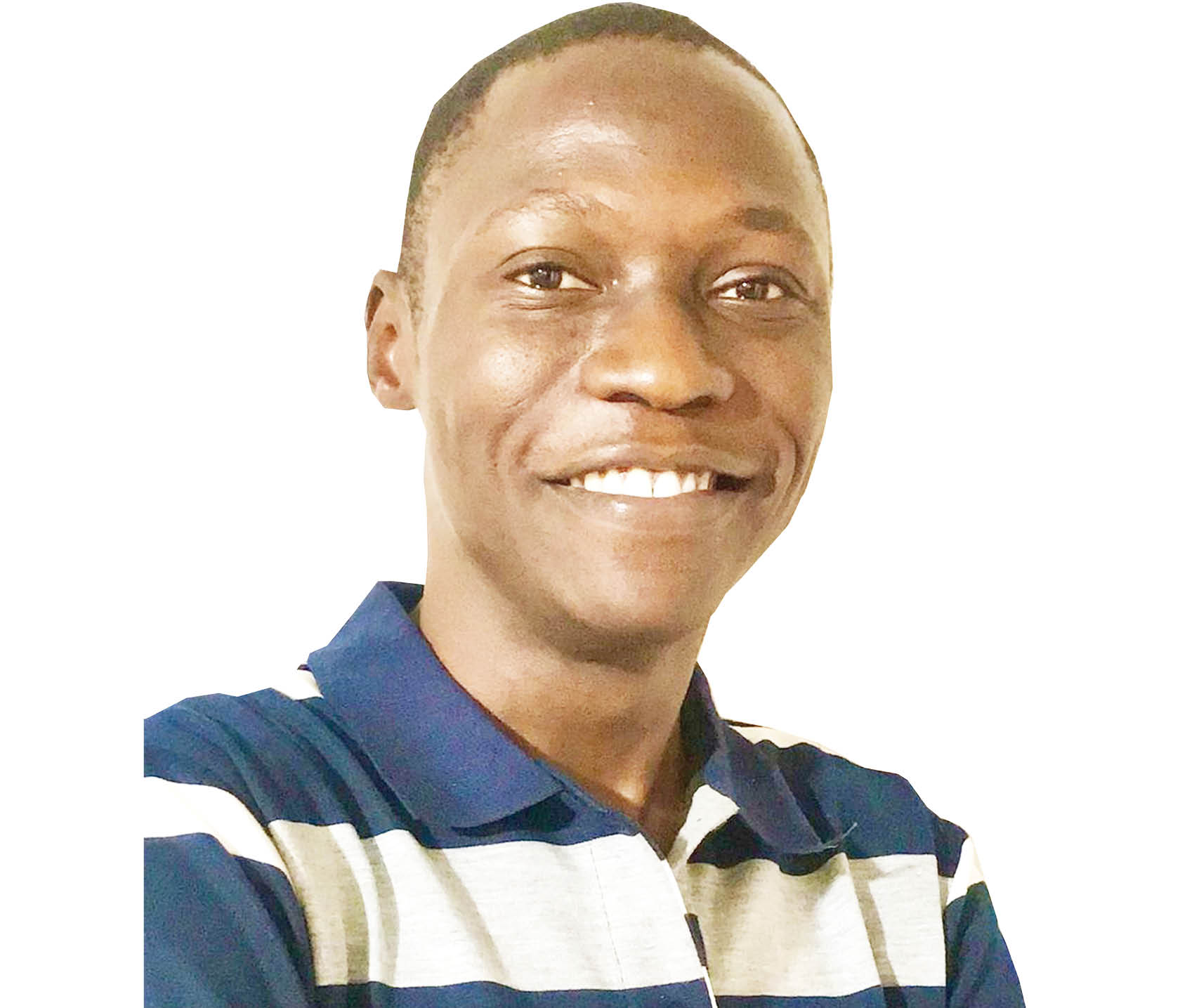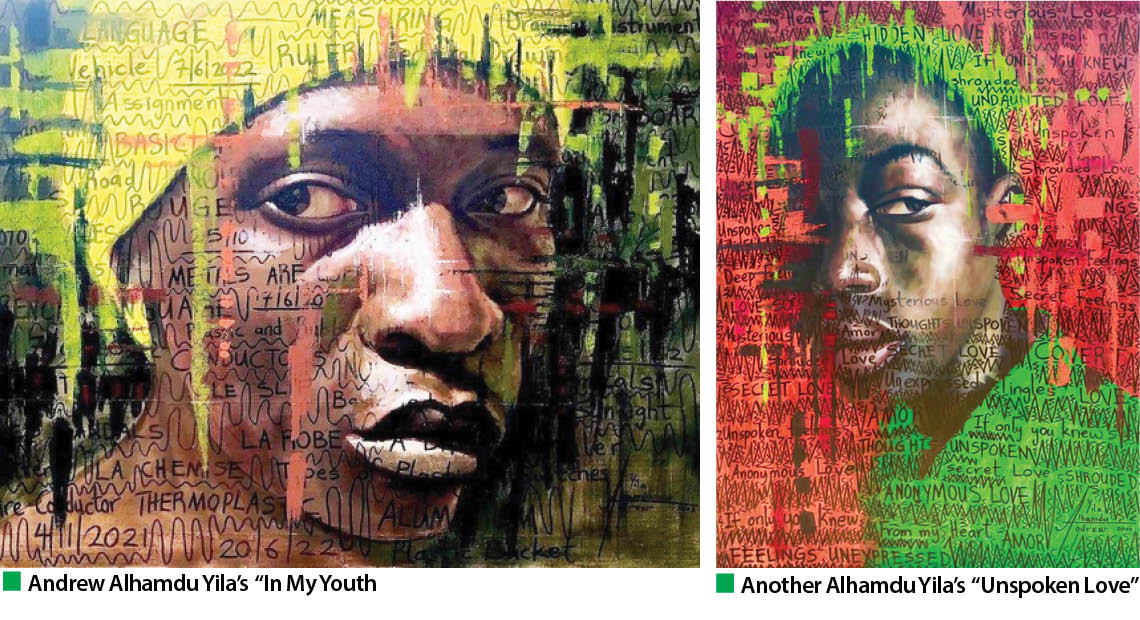My relationship with my artworks is like a polygamous dater – Andrew Alhamdu Yila
Born into an artistic family, it was no surprise that Andrew found his path in the art world. In this interview, he shares what art means to him and his progress as an artist, so far. Where did your love for art start from? This is an interesting question because there are two starting […]

Andrew Alhamdu Yila
Born into an artistic family, it was no surprise that Andrew found his path in the art world. In this interview, he shares what art means to him and his progress as an artist, so far.
Where did your love for art start from?
This is an interesting question because there are two starting points for me – the first subconscious while the later was conscious. My parents told me that from a very young age, I had a passion for art. I always came around my dad when he was working. He is an artist specialized in Graphics. Unfortunately, my inquisitiveness disturbs his work process sometimes, so there was this day he had to pursue me from his studio. As I went away, I stopped at the door, pointed at him and said ‘one day I will draw better than you.’ I call this point subconscious because I never remembered doing that until I was told years later after I had graduated from the university as a formally trained artist. After that first stage, I totally lost interest in art; not because my dad pursued me that day but, as I will later realize, because the graphics part of art I saw at home was not what I had within me. It was until years later in JSS 2 at about 13 years of age that I, for the first time, encountered a fine art teacher, Mr. Banjo Oyebanji. He is a painter. My first encounter with his drawing was a wow experience. It was as if a demon I was possessed with that I never knew was in me just woke up, same thing when I first saw his painting. Instead of feeling it was hard to do, I felt I could do this despite not drawing for years. This was my second point of falling in love with art. This one was very conscious and deliberate. And that conscious decision helped me because I had many challenges to becoming an artist.
How has your background influenced your work?
My background in art was quite tough and that still influences how I work today. Despite growing with a father who’s an artist, I had to go through many hurdles. My dad didn’t actively push me towards art because he was afraid I was edging towards art just because I wanted to copy his career path. So, he was careful in urging me on in art. But thankfully, he always bought materials I requested for. For me, I didn’t even like graphics which was his area of specialty. I was bent on art, specifically drawing and painting, because it’s a gifting in me from God. Some of the challenges in my background was that I had no consistent fine art teacher in my secondary school. I mostly studied and practiced on my own. Actually, I encountered four different fine art teachers in secondary school but the time they spent cumulatively at best was not more than one session out of the six sessions in secondary school. So, it was difficult. Fortunately, those four teachers came at the point they came either to kindle my passion, rekindle my passion or point me in a direction I need to go. I will always thank them. When I registered for Fine Art in my WAEC, everyone thought I was crazy. But I and my friend Jerry had been reading and practicing on our own. And I made a distinction. That tough path I followed has made me more dogged and resilient in my art practice. I learnt that if it will be, it is all up to me and God. No excuses!
Chimamanda Adichie unveils “Mama’s Sleeping Scarf”
Nwando Achebe wins 2022 ‘NYASA Distinguished Africanist Award

How did you develop your art skills?
Through continuous daily practice and studying those ahead of me in skill. It’s a two-edged sword.
What is your preferred medium and why?
I love oil colors especially on canvas. Some artists say it’s more technical. That is true, but I love its flexibility.
What motivates you to create?
A combination of things. On a purpose level, I want to die emptied of all or most of the paintings locked up in me. Professionally, the human figure, particularly the human face, motivates and inspired me a lot. It could be beauty, ugliness, a form, light or an expression on the face. Can I say money is a good motivation too?
Does your work address any societal issue and why that?
It has been a long time since I based my work on addressing societal issues. The issues in my country are many and they seem to multiply. I think similar thing can be said for many countries. What I rather do now is that I create art that gives succor to the human mind, remind us to be courageous regardless of the odds, works that remind us that we are still alive despite hard times, works that look into the viewer’s eyes and let them know they are not alone in the human experience and tell us that there is still beauty in and around us.
How has your artistic career progressed so far?
The artistic journey is an adventure. Mine is no different. There are points in the adventure when you’re paying prices. And there are points of reaping and enjoying the sunshine. I believe I’m paying the price now for my sunshine.
Has your style evolved over time and how?
Oh yes! My style has evolved and metamorphosed severally. I say art is organic (meaning art is living and grows). I began with the conventional painting style in school. In my final year, I began the style that is now unique to me. Thanks to my supervisor Professor Jerry Buhari who encouraged me despite discouragements from several quarters. Today, my style of incorporating imagery, text and lines has passed through several modifications. For example, I used to paste hand written notes on canvas but now I work directly on the canvas but achieving similar effect. Listening to your material, listening to your subconscious and study helps in refining one’s style. My recently concluded Master’s degree helped also in further development of my style.
Is there a particular atmosphere or tool that’s essential to your work?
Yes, there is and I create that atmosphere with music. I’m like a plane. The take-off has much friction so I most times utilize fast music to ascend. When I’m at the height of inspiration in my soul, a cool music helps me glide and soar. My most important art tool is myself.
What factors influence the price of an artwork?
The nature of the artwork and its size.
Which of your works will you tag your favorite and why?
My analogy to answer this question is in no way meant to be condescending to women. I don’t have a favourite artwork. My relationship with my artworks is like a polygamous dater. I have many girlfriends (artworks). I love each of them for specific reasons. However, I tend to favor the newer ones.
Have you ever experienced a creative block and how did you overcome it?
In the realm of full-time studio practice, creative block is a constant every now then. So, I am conversant with it. I circumvent it in many ways: change my music, take a stroll, sleep, dump the old canvas and pick a new one, read, think and meditate, take a soft drink with a strong taste, visit the studios of my artist friends. But there are times of working despite the creative block. That takes lot of discipline.
Will you say there’s a strong network of artists in Nigeria to make way for upcoming artists?
It’s not sufficiently strong I must say. The network I’ve observed so far has been on a personal level. Senior artists grooming and helping younger artists. But there is only so much they can do personally. For me, thanks to Sor Sen for recommending me for this interview. And thanks to institutions like the Daily Trust for having platforms like this. But I think more needs to be done, especially at the governmental level.
Will you say art is more appreciated now in Nigeria and how does that affect your career as an artist?
Appreciation of art in Nigeria is growing, but I think we as artists in Nigeria have benefitted more from the appreciation of our art in the diaspora than in Nigeria. The Nigerian market needs not just growth but expansion too.
If you could have one super power, what will it be?
To be able to paint faster and not get tired. There are so many paintings in me more than I can bring out per time.
